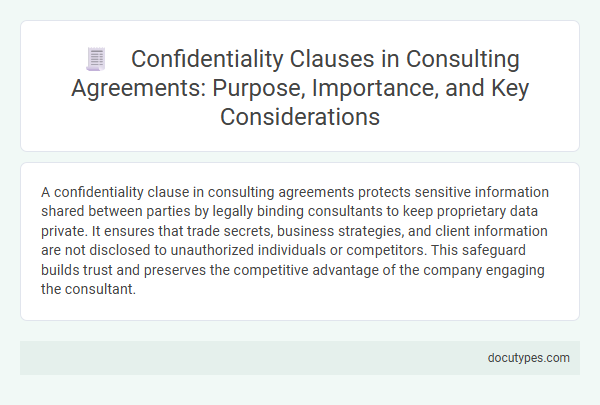A confidentiality clause in consulting agreements protects sensitive information shared between parties by legally binding consultants to keep proprietary data private. It ensures that trade secrets, business strategies, and client information are not disclosed to unauthorized individuals or competitors. This safeguard builds trust and preserves the competitive advantage of the company engaging the consultant.
Introduction to Confidentiality Clauses in Consulting Agreements
| Introduction to Confidentiality Clauses in Consulting Agreements | |
|---|---|
| Purpose of Confidentiality Clauses | Confidentiality clauses protect sensitive information exchanged between parties in consulting agreements. They ensure that proprietary data, trade secrets, and business strategies remain secure and undisclosed to unauthorized individuals. |
| Scope of Information | These clauses cover all forms of confidential information, including written, oral, and electronic data shared during the consulting relationship. |
| Legal Obligations | Confidentiality clauses create legally binding obligations that prevent parties from using or sharing protected information beyond the terms of the agreement. |
| Importance to You | In your consulting agreements, this clause safeguards your business interests by ensuring trust and limiting the risk of sensitive information leakage. |
Defining Confidentiality in Consulting Contexts
A confidentiality clause in consulting agreements safeguards sensitive information exchanged between parties. It establishes clear boundaries on what information must remain private.
Defining confidentiality in consulting contexts involves specifying the types of data or knowledge considered proprietary or sensitive. This often includes client business strategies, financial details, and personal information. Your role as a consultant necessitates respecting these protections to maintain trust and legal compliance.
Purpose of Confidentiality Clauses
What is the purpose of a confidentiality clause in consulting agreements? Confidentiality clauses protect sensitive information exchanged between parties during the consulting relationship. You ensure that proprietary data, trade secrets, and business strategies remain secure and undisclosed to unauthorized individuals.
Importance of Confidentiality for Consultants and Clients
The purpose of a confidentiality clause in consulting agreements is to protect sensitive information exchanged between parties during the consulting relationship. This clause ensures that trade secrets, business strategies, and proprietary data remain secure, fostering trust between consultants and clients. Your commitment to confidentiality safeguards competitive advantages and maintains professional integrity throughout the engagement.
Key Elements of an Effective Confidentiality Clause
A confidentiality clause in consulting agreements protects sensitive information exchanged between parties. It ensures that proprietary data, trade secrets, and business strategies remain secure.
Key elements of an effective confidentiality clause include clear definitions of confidential information and the obligations of each party. Timeframes for confidentiality, exclusions, and consequences for breaches are critical components to enforce protection.
Scope and Limitations of Confidentiality Obligations
A confidentiality clause in consulting agreements defines the boundaries within which sensitive information must be protected. It clarifies the extent and limits of confidentiality obligations to prevent misunderstandings and legal disputes.
- Scope of Confidential Information - This specifies the types of data or materials considered confidential, including proprietary business details and trade secrets.
- Duration of Confidentiality - It outlines how long the consultant must maintain secrecy, often extending beyond the term of the contract.
- Exclusions and Limitations - The clause identifies information not subject to confidentiality, such as publicly available data or info disclosed by legal mandate.
Common Exceptions to Confidentiality Requirements
A confidentiality clause in consulting agreements protects sensitive information shared between parties, ensuring business secrets remain secure. Common exceptions include information already public, independently developed knowledge, or data disclosed under legal obligations. You must understand these exceptions to manage your confidentiality responsibilities effectively.
Duration of Confidentiality Commitments
The purpose of a confidentiality clause in consulting agreements is to protect sensitive information shared between parties. The duration of confidentiality commitments ensures that this protection extends beyond the termination of the contract.
- Fixed Duration - Specifies the exact time period during which confidentiality must be maintained after the agreement ends.
- Indefinite Duration - Requires that confidential information remains protected indefinitely to prevent any future disclosure.
- Post-Termination Obligations - Defines responsibilities regarding information protection even after Your consulting relationship concludes.
Clear duration terms help both parties understand their ongoing confidentiality responsibilities.
Consequences of Breaching Confidentiality
A confidentiality clause in consulting agreements protects sensitive information shared during the professional relationship. It ensures that your proprietary data and trade secrets remain secure and undisclosed to unauthorized parties.
- Legal Action - Breaching confidentiality can lead to lawsuits and significant financial penalties for damages caused by unauthorized disclosure.
- Loss of Trust - Violating a confidentiality clause damages professional reputation and may result in termination of the consulting contract.
- Competitive Harm - Unauthorized sharing of confidential information can benefit competitors, causing irreversible business harm to the disclosing party.
What Is the Purpose of a Confidentiality Clause in Consulting Agreements? Infographic

